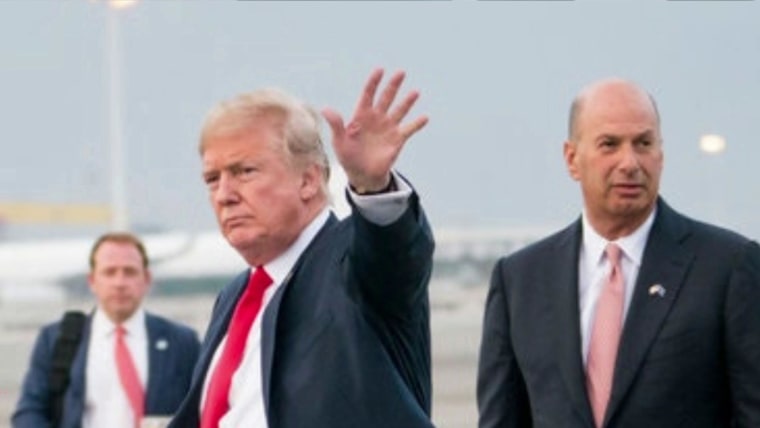Recently disclosed text messages put Donald Trump's Ukraine scandal in a new and unflattering light, bringing the nature of the quid pro quo into sharp focus. One message showed Bill Taylor, the acting U.S. ambassador in Ukraine, asking U.S. Ambassador to the European Union Gordon Sondland, "Are we now saying that security assistance and [a White House] meeting are conditioned on investigations?"
In a subsequent message, Taylor added, "I think it's crazy to withhold security assistance for help with a political campaign."
Nearly five hours after that text was sent, Sondland -- a Republican megadonor with no experience in diplomacy or foreign policy -- replied, "Bill, I believe you are incorrect about President Trump's intentions. The President has been crystal clear no quid pro quo's of any kind."
It was a difficult message to accept at face value, since common sense suggests it was written as a cover story. But for the White House, Sondland's text effectively negates the controversy. As the story goes, the U.S. ambassador to the European Union, tackling policy in Ukraine for reasons unknown, exonerated his boss with his online message.
Except, it's not quite that simple, as Sondland is poised to tell lawmakers when he appears on Capitol Hill this week.
U.S. Ambassador to the European Union Gordon Sondland will testify to Congress [on Thursday] that he did not know why United States military assistance to Ukraine was held up nor who ordered it, according to a person with knowledge of Sondland's testimony before the House next week.Sondland will say that he "relied on the president's assurances in good faith and passed these along" when he texted Ambassador to Ukraine Bill Taylor that there was no quid pro quo with Ukraine, the person said. President Donald Trump has urged Ukraine to investigate the son of political rival Joe Biden.
To put this in some rough chronological order, Bill Taylor, a career official, effectively told Sondland, "This sure seems wrong." At that point, Sondland talked to Trump, and the president effectively said, "I'm not doing anything wrong," which Sondland then texted back to Taylor.
The trouble, we now know, is that Sondland was simply taking Trump's word for it -- and given the president's capacity for staggering dishonesty, and everything we now know about this scandal, that was probably unwise.
Sondland didn't have independent knowledge about whether there was a quid pro quo or not; he simply had the president's unreliable claims to go on. The ambassador didn't even know whether Trump's denial was true; Sondland was simply playing the role of messenger.
Why does that matter? Because for Trump and his allies, Sondland's text about the president's "crystal clear" intentions is a central pillar of the White House's entire defense. If the reporting from the weekend proves true, Sondland will knock that pillar down during his testimony this week.
What's more, the Washington Post reported, "Sondland is expected to say that for months before the Sept. 9 message, he worked at the direction of Rudolph W. Giuliani, Trump's personal attorney, to secure what he would call in another text message the 'deliverable' sought by Trump: a public statement from Ukraine that it would investigate corruption, including mentioning Burisma, a Ukrainian energy company, by name. In exchange for the statement, the president would grant Ukraine's new president a coveted White House audience."
Last week, the Trump administration scrambled to block Sondland's testimony. Suddenly, we have a pretty good sense of the motivations behind that decision.
